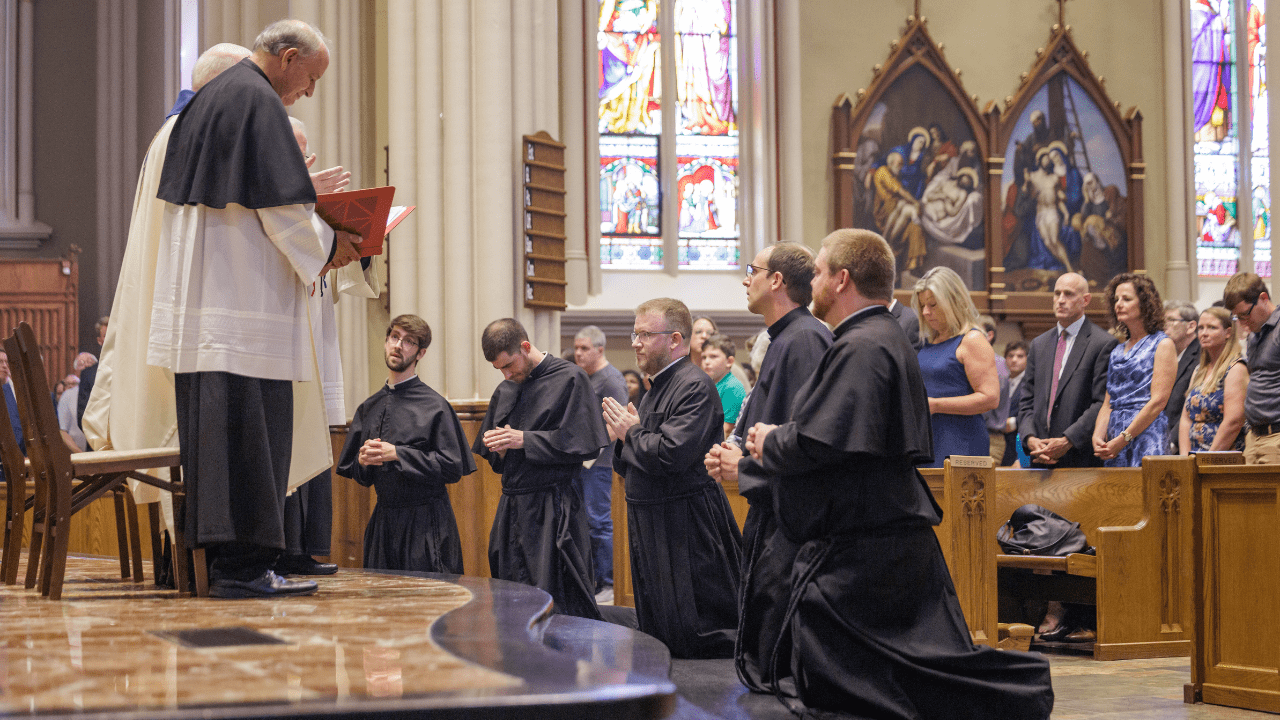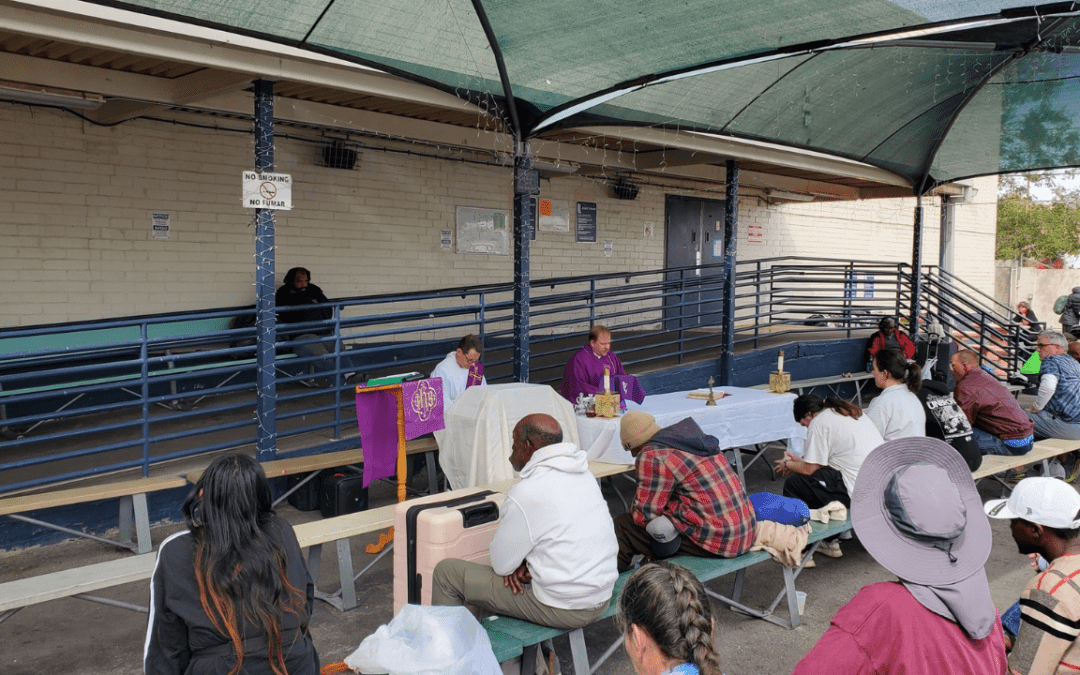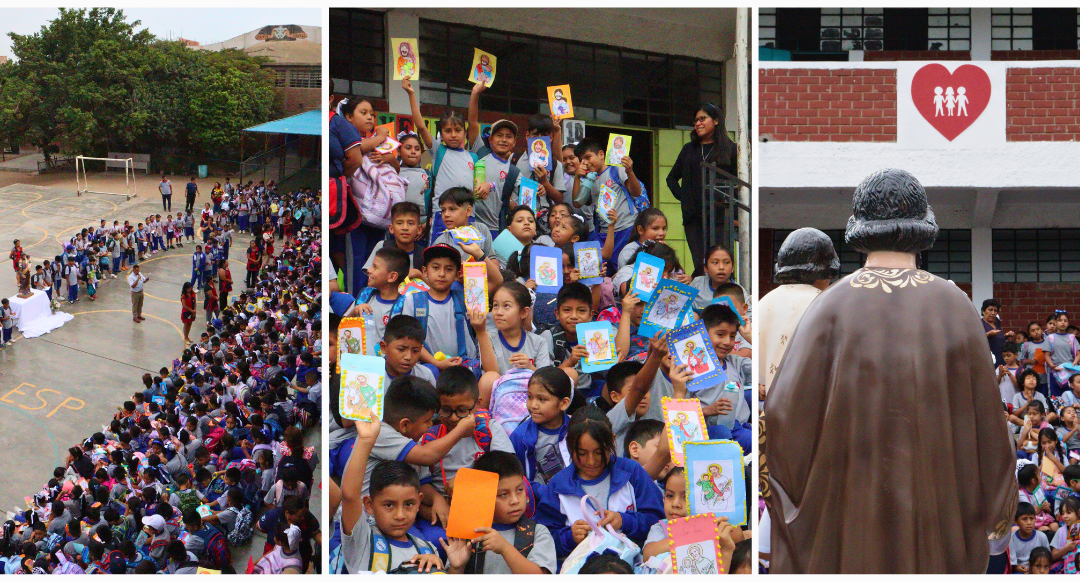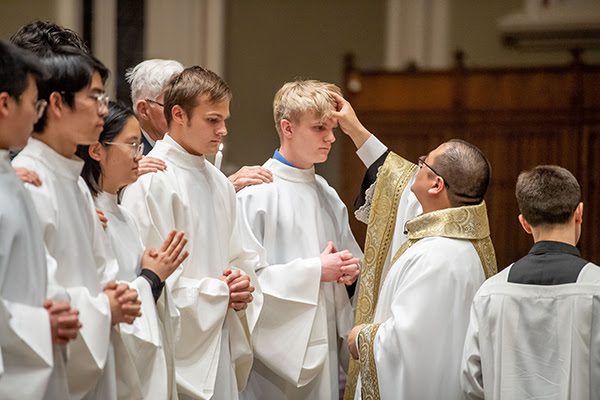A little over a month ago, five Holy Cross religious professed their final vows, perpetually consecrating themselves to God through the vows of poverty, chastity, and obedience. It seems to me that some in our world today feel more inclined to tell them “sorry” than to say “congratulations.” Some see the vows as misguided, antiquated, and even inhuman. How could it be good to give up your God-given freedom to live and work as you please by the vow of obedience? How could you willingly embrace a life of poverty? Above all, how could you profess the vow of chastity and give up the physical intimacy that (so many think) we cannot be happy without?
Are they right? Are our vows merely sacrifices and nothing more—three different ways to cause misery for ourselves? At first glance, Blessed Basil Moreau might give that impression. In his spiritual exercises for the novices, he wrote, “Religious life essentially means in practice stripping yourself of the life of the flesh by means of mortification and chastity, stripping yourself of the life of pride by obedience and humility, and stripping yourself of the life of comfort and ambition by poverty.” That does not sound like fun!
Here in Chile, we recently celebrated the national day of consecrated life on August 15th, although the rest of the Church celebrates consecrated life on February 2nd on the Feast of the Presentation. As I prayed on the feast day this year on a different day than usual, I meditated on the presentation of the child Jesus in the temple in Jerusalem, asking why the rest of the Church celebrates consecrated life on that day. What does the Presentation have to do with our vowed life? I think the answer reveals why the vows are not merely sacrifices but a unified means to a life of true abundance.
By the time Jesus was born, it seemed like God had left the temple in Jerusalem where He was said to have dwelt. The Israelites had been conquered again and again by foreign enemies, and now they were occupied by the often-brutal Roman army. God seemed absent. Poverty and oppression seemed to rule the day. Yet, on a fateful day some 2,000 years ago, Mary and Joseph presented their child in the temple according to Jewish law. For the first time in the history of the world, God filled the temple not just with a mysterious, invisible presence as He had done in the past, but in flesh and blood. God incarnate was present in the temple for all to see!
This reveals the meaning of the vows. They are meant to dispose us to be consecrated temples where Jesus might dwell and present Himself once again to His people. Yet, for a temple to be consecrated, it must first be purified. It must be emptied of all that is evil and even of worldly, mundane things. The vow of poverty intends to do just that: to empty me of worldly possessions and attachments, thus creating an empty space in me where God might come to dwell. If I fill my life with possessions and the pursuit of wealth and honor, I become like the inns on the night of Jesus’ birth. I have no empty space in me for Him to be born. I must, instead, become emptied and simple like that humble manager where the baby Jesus was first laid to rest.
Yet, I might have emptied my heart by my vow of poverty, but if I do not unceasingly pursue Jesus Christ and let Him fill the empty spaces of my life, something or someone else will fill them. I have met a few religious who lived the vow of poverty radically but had given the empty space of their hearts to one other than the Lord—perhaps to workaholism, to resentment, to an addiction, or even an inappropriate relationship with another person. It is like in the Gospel of Matthew when Jesus speaks of someone who has had an evil spirit cast out of him, and then seven more evil spirits return to fill the person. Jesus laments that “the last condition of that person is worse than the first” (12:45).
This is where the vow of chastity comes in: we consecrate our hearts solely to the Lord, vowing that we will wholeheartedly and unequivocally seek Him and let Him dwell in us all the days of our life. If we live according to this vow, pursuing the Lord each day in intimate prayer and loving service to Him, the Presentation will be replayed in us. He will dwell in us and so present Himself to His people wherever we might be.
We are different from the temple of old. The temple of old was fixed on solid ground, remaining in a single place. The people often had to journey long distances in order to encounter God in the temple. Now, we are living temples that are to bring the Lord to the people. This is why obedience is so key for us. Where am I to go? Where I am to bring the Lord who is present in me? If I fail to seek out the Father’s will, I will bring the temple that is myself to wherever I want. Perhaps I will think I am bringing Him glory when in reality I am trying to bring myself glory. I might become the kind of religious that strives to draw the attention and the praises of the people to me—not to the Lord—by focusing on my own projects, my own ideas, my own desires, and not those of the Lord. Instead, by the vow of obedience, I am to abandon myself to Divine Providence by going wherever my superiors may send me, attending to every person who the Lord places in front of me, and striving to complete all my tasks with joy and according to the will of God. Then, with my heart emptied by poverty and filled wholly with Him through chastity, this little temple of His on two legs will go into the highways and the byways and bring the feast of His loving presence to His people.
This, in the end, is the true goal of religious life for Blessed Basil Moreau. As he says immediately after the quote cited above, “Thus you will establish in yourself the kingdom of Jesus Christ which consists in banishing from your inner depths every spirit except that of Jesus Christ, so that all the virtues of Jesus Christ may come alive in you.” For this reason, I must say to my brothers who just professed their final vows, thanks for consecrating yourselves as temples of the Lord in the Congregation of Holy Cross! Congratulations for saying “yes” to such a solemn and beautiful vocation.
Fr. Zach Rathke, C.S.C.
Published 08 October 2024




